Introduction
A country’s GDP remains one of the most important parameters to benchmark development with other countries (Fama, 1990). This essay evaluates the GDP of three different countries, namely China, Greece and Australia. Various aspects of the GDP and the economies of the aforementioned countries will be evaluated.
Australia
GDP
The table below shows the GDP of Australia. It is worth 1.5% of the world economy, Australia’s average Gross Domestic Product was 380 billion dollars in 2000 which reached up to 1050 billion in the year 2009. Although the economy of Australia is driven by the service sector, the recent economic improvement is due to a lot of agricultural and mineral resources.
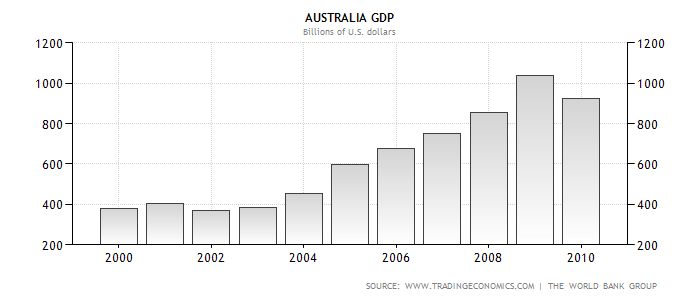
Annual Growth Rate
The following chart depicts the annual growth rate in Australia. It is not constant and fluctuates in all the years from 1999-2012.However, the highest achieved annual growth rate is in the 3rdquarter of the year 2007 (Trading Economics1, 2012).
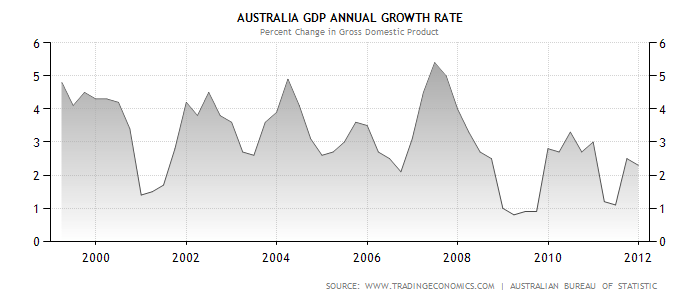
Inflation Rate
The inflation rate in Australia has ranged from approximately 1.2% to 6.1%.The highest inflation rate was attained in the year 2000 and 2001.
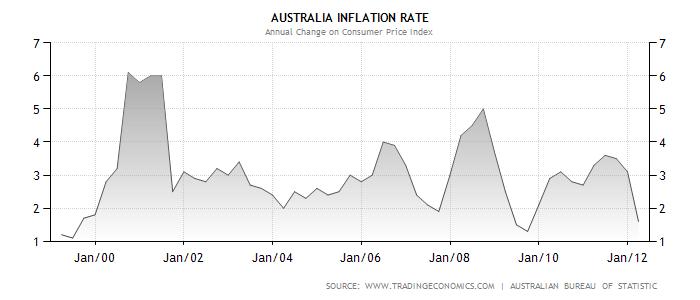
GDP Per Capita
The Gross Domestic product per capita has gradually been increasing from the year 2000 to the year 2009 and then drops in the year 2010.
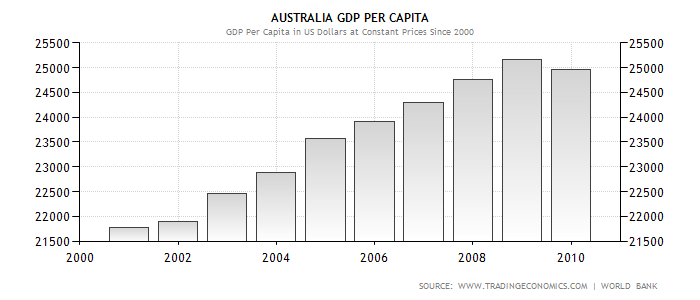
Interest Rate
The interest rate of Australia in the year 2009 was as low as 3% and the highest registered was approximately 7.3% in the year 2008.
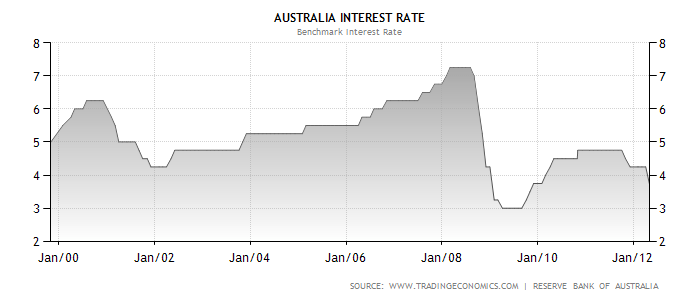
Unemployment
From the table, the unemployment rate was very high in the year 1999(7.3%) but with increased industrialization, this has steadily reduced to 4% in the year 2008. In Sinha,(1998), predicted that the unemployment rate in china would go down due to industrialization prospects.
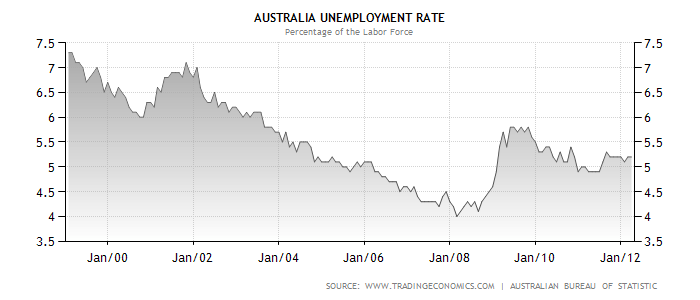
China
GDP
The Gross Domestic Product has increased tremendously from the year 1999 to the year 2011.The highest that was achieved was approximately 5.8 billion dollars.
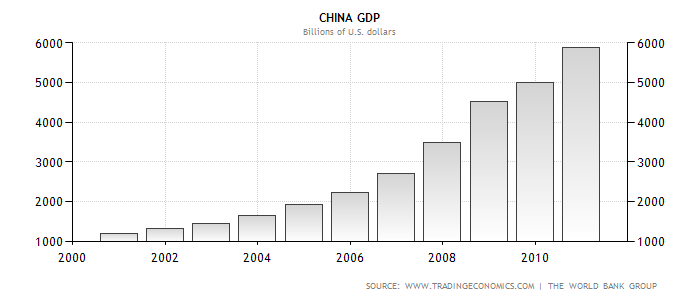
Annual Growth Rate
In the year 2000 the annual growth rate of the GDP was 6% while the highest attained was 13% in the year 2009.This is illustrated in the chart below (Trading Economics2, 2012).
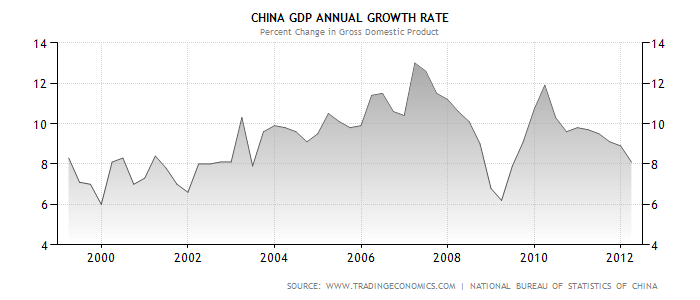
GDP Per Capita
In China the GDP per capita has been increasing from the year 2000 to the year 2011 despite the increasing population.
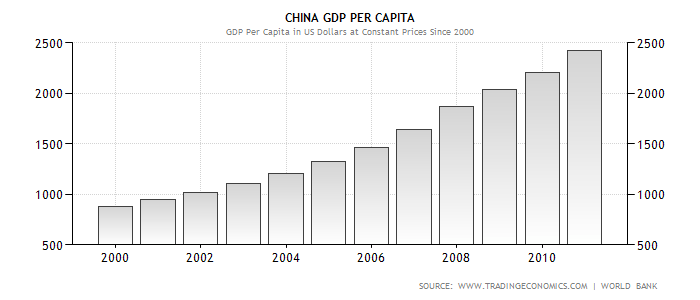
Inflation Rate
In the chart it is clear that the highest inflation rate was attained in the year 2008 while in the year 2000 it was as low as -2.2%.
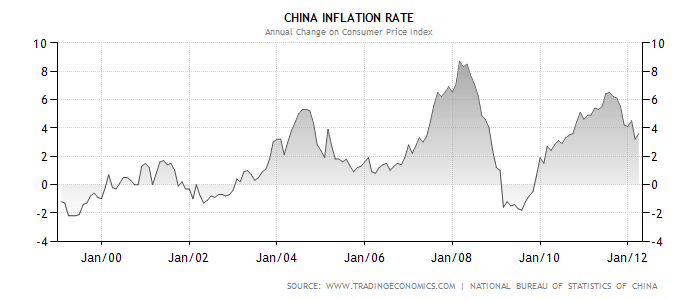
Interest Rate
In the year 1999, the interest rate in China was 6.3%, while in the half of the year 2009 to the 1st half of the year 2010; the interest rate was constant at around 5.3%.
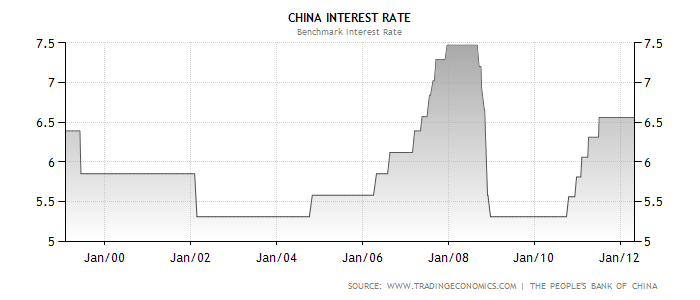
Unemployment
The unemployment rate of 4.3% was the same and highest in the year 2004, 2010 and 4th quarter of 2011.In the year 2008, it was constant at 4%.
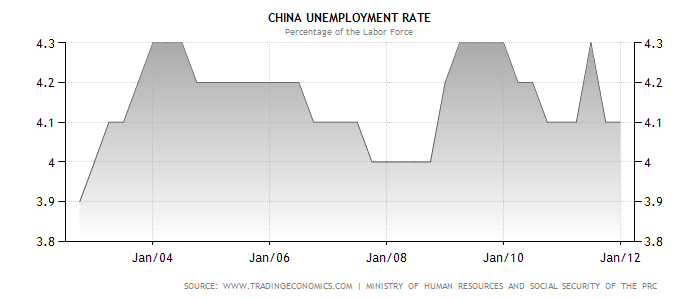
Greece
GDP
In the year 2009, the Gross Domestic Product of Greece 347.042 billion dollars while in the year 2000, it was 134.408 billion dollars.(Trading Economics3, 2012).
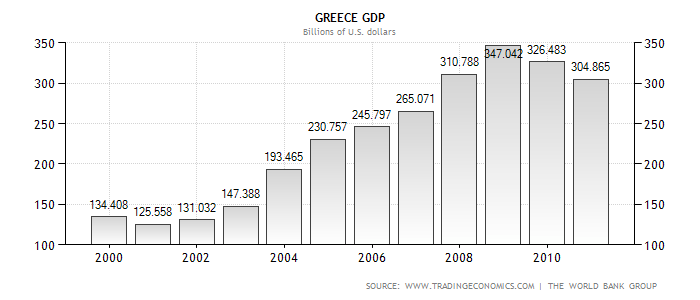
Annual Growth Rate
The annual growth rate of GDP is positive from the year 1999 to the year 2008 while it is negative from the 4th quarter of the year 2008.
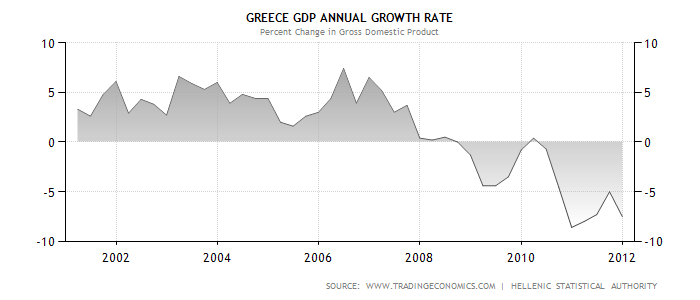
GDP Per Capita
The highest GDP per Capita in Greece was recorded in 2008 while the least was in the year 2000.There is an increase from the year 1999 to 2008 and then reduces
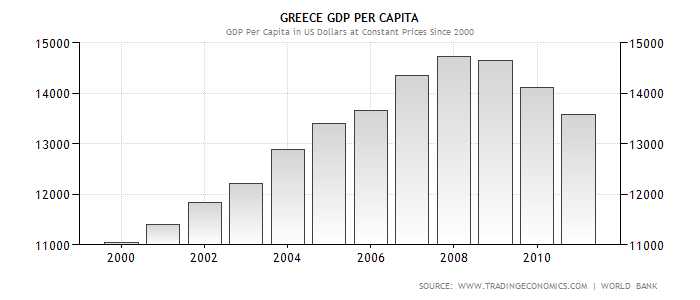
Inflation Rate
The highest registered inflation rate in Greece was approximately 5.6% in the year 2011 while the lowest was 0.5% in the 3rd half of the year 2009.
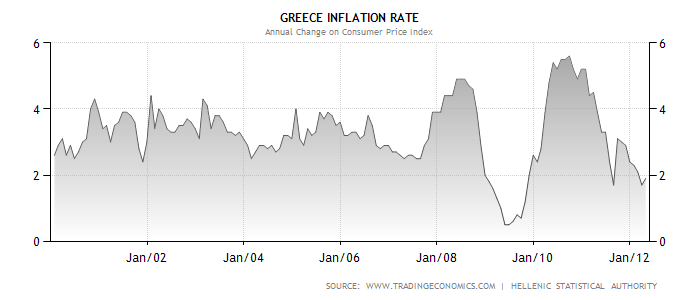
Interest Rate
Euro area, in which Greece is a member had the highest interest rate in the year 2001 of about 5.7% while in the year 2010, the interests rate had reduced to 1%.
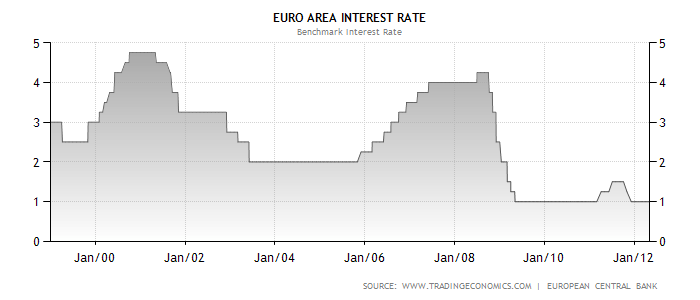
Unemployment
In Greece, the unemployment rate had been reducing from the year 1999 which was at 12% to the 3rd quarter of the year 2008 and then it began to rise. By Jan 2012, it was at 22%.
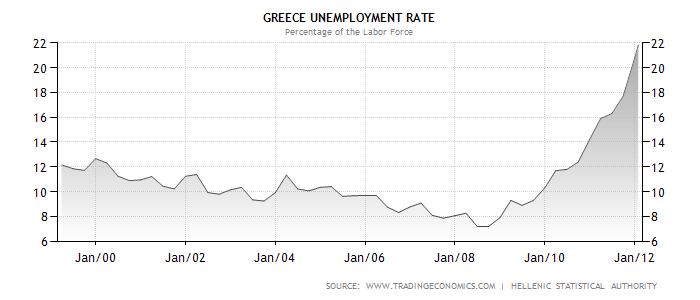
Calculation of Real Interest Rate for the Year 2011
The following is the formula used to calculate real interest rate
r = n – i
Where:
i: is the Inflation Rate
n: is the Nominal Interest Rate
r: is the Real Interest Rate
Australia
In the year 2011
i=3.275%
n=4.75% so r=4.75%-3.275% =1.475%
China
In the year 2011
i=5.5%
n=6.3% Therefore, r=6.3%-5.5% =0.8%
Greece
In the year 2011
i=4%
n=1.4% so, r=1.4%-4%= -3.6%
Comparison and Similarities of Different Variables
Real GDP
This refers to the value reached after valuing all the productive activities in specific year’s prices after taking care of inflation (Ligang and Golley, 2011). It allows the use of the same value for comparison of the purchasing power over a period of time.In Australia, the lowest GDP levels are from the year 1999-2004.In 2005, the Gross Domestic Product increases up to the year 2009 and then falls in the year 2010.
This is contrary to the behavior of GDP in China since there are no fluctuations in GDP levels. There is a continued increase in Gross Domestic Product from the year 1999 to 2011.A similarity exist between Australia and China in that in both countries, the GDP levels are low between the years 2000 and 2005. In Greece, the GDP was highest in the year 2009 and lowest in the year 2001.
Real GDP Annual Growth Per Capita
It is based on a constant local currency and it is realized by dividing the GDP by the population. From the illustrations of annual growth per capita of real GDP in Australia, China and Greece, it is very difficult to predict the levels since they keep fluctuating from year to year.
Real GDP Per Capita
In Australia and Greece, the GDP per capita first increases and then diminishes while in China, the trend constantly increases.
Inflation Rate
Inflation rate is a measure of inflation and it includes the increase in the general price levels in a country which reduces the purchasing power of the consumers and hence the consumer basket is reduced. On average, throughout the years, Greece has the highest inflation level while China has the lowest and just like the real GDP annual growth per capita, it keeps changing.
Unemployment Rate
In Greece the unemployment rate has increased up to 22% in the year 2012.This is a very high rate compared to Australia and China that have unemployment rate of 5.3% and 4.1 respectively.
The Influence of GFC in Australian Economy
The GFC spread from the EU and the US to developing countries. The stimulus package of Australia, as a proportion of GDP, was rated at 5.4% making it to be the third largest. The Global Finance Crisis has negatively influenced the economy of Australia in that the assistance to boost the economy reduced. Consequently, the economy has struggled to manage the balance of payments as well as its expenditure. This led to increase of interest rates in the year 2011.In the same year; the unemployment rate is also high at approximately 5.3%.
The Influence of GFC in Chinese Economy
The integration of China to the global economy led to externalities for example the rise of fuel prices which led to increase in inflation rate of other countries. During this crisis, the China economy really tried to stabilize the economic growth through export of low priced commodities. This positively influenced the GDP of the China economy. China is now the world’s second largest economy.
Macroeconomic Behavior of Australia & Greece
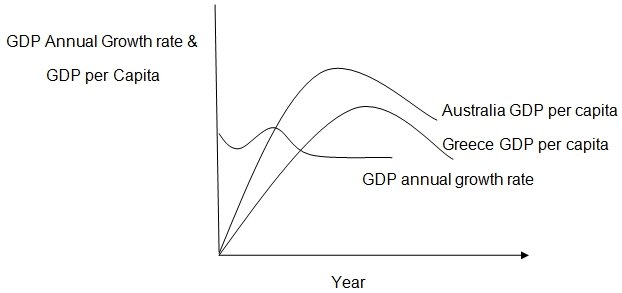
From the diagram, the GDP per Capita in Australia is higher than that in Greece. The GDP per capita from both countries have the same trend in that it rises and then drops.Using the GDP per capita to measure the well-being of the population in each country, then it can be concluded that Australia is more economically stable compared to Greece. The same sentiments are shared by Thompson (2009) who assert that the continued growth of the GDP helps in building the wellbeing of the citizenry.
Unemployment Rate
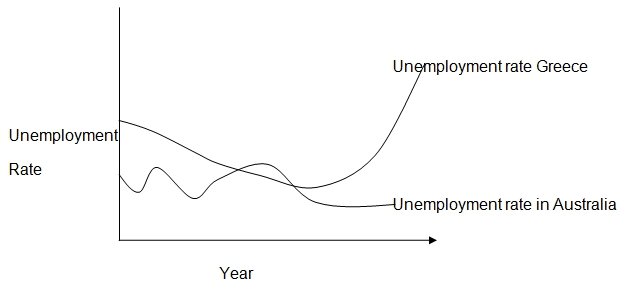
The unemployment rate starts from a higher level than that of Australia. However, it then reduces insignificantly and then rises. Currently, there are very many people in Greece that are unemployed and this is a sign that most people are able to provide for their basic needs for example food, shelter, clothing and minimum education.
In Australia, it is evident that the unemployment rate has been reducing considerably throughout the years and as a result the gross domestic product has increased greatly. In Greece, the unemployment can be reduced by improvement in creation of job opportunities by the government, individuals as well as corporate entities.
Reference List
Fama, E., F. 1990 ‘Term structure forecasts of interest rates, inflation, and real returns’, Journal of Monetary Economics Vol 25 No. 1. Pp 59-76.
Ligang, S., and Golley, J. 2011. Rising China: Global Challenges and Opportunities. ANU E Press: Tokyo.
Sinha, D. 1998 Economic growth and government expenditure in China. University Library of Munich Press: Munich.
Thompson, H. 2006 International Economics: Global Markets And Competition. World Scientific Press: New York.
Trading Economics1, 2012 Australia GDP Growth Rate. Web.
Trading Economics2, 2012 Australia GDP Growth Rate. Web.
Trading Economics3, 2012 Greece GDP Growth Rate. Web.